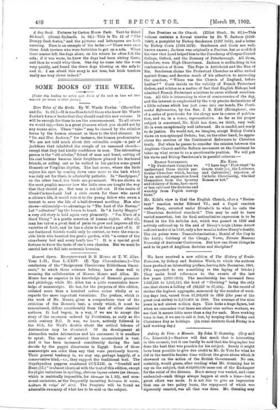Tito Treatises on the Church. (Elliot Stock. 3s. 61)—This volume
" contains a formal treatise by Dr. T. Jackson (1585-
1640), a pamphlet by Bishop Sanderson (1587 1663), and a letter by Bishop Cosin (1594.1672). Sanderson and Cosin are well.. known names ; Jackson was originally a Puritan, but so modified his view that. Laud helped him to the Presidency of Corpus Christi College, Oxford, and the Deanery of Peterborough. All. three, therefore, were High Churchmen. Jackson is unflinching in his.
condemnation of Rome. The Pope is Antichrist and the Man of Sin. Sanderson claims the Protestant Churches as allies united against Rome, and devotes much of his attention to answering
the question, ".Where was the Church of England, ,before Luther ? " Cosin insists on the validity of French Protestant Orders, and relates as a matter of fact that English Bishops had
admitted French Protestant ministers to cures without reordina-
tion. All this is interesting in view of controversies of the day, and the interest is emphasised by the very precise declarations of a little volume which has just come into our hands, The Conti- nental Reformation, by the Rev. J. B. Kidd (Rivingtonsl, one of a series of text-books for the clergy now in course of publica-
tion, and so, in a sense, representative. As far as his proper subject is concerned, Mr. Kidd has done, we think, very well. He is even exceptionally well informed. He is candid, and ready to do justice. He would not, we imagine, accept Bishop Cosin's views on non-episcopal Orders; but, on the other hand, he appre- ciates the services of the Continental Reformers to Christian truth. But when he passes to consider the relation between the Anglican Church and the Reform movement on the Continent he takes up what seems to us a questionable position. We will put his views and Bishop Sanderson's in parallel columns :— BISHOP SANDERSON. Ma. KIDD.
"By Protestant Churches we "I have kept Protestant' to understand those visible par- denote their [i.e., the Lutheran titular Churches which, having and Calvinistic] rejection of by an external separation freed Catholic Christianity, whether themselves from the tyranny Roman or not." and idolatry of Rome, have more
or less reformed the doctrine and
worship from Popish corrup- tions."
Mr. Kidd'a view is that the English Church, after a " Protes- tant " reaction under Edward VI., and a Papal reaction under Mary, reverted under Elizabeth to what he calls the " Henrician doctrinal standard." This may be said to have varied somewhat, but its final authoritative expression is to be found in the Six Articles Act, which was passed in 1533 and actively enforced up to the end of Henry's reign (Anne Askew suffered under it in 1546, only a few months before Henry's death).
The six points were : Transubstantiation ; Denial of the Cup to the Laity ; Celibacy of. the Clergy; Vows; Private Masses; Necessity of Auricular Confession. But how can these things be said to be part of Anglican doctrine and discipline?






































 Previous page
Previous page